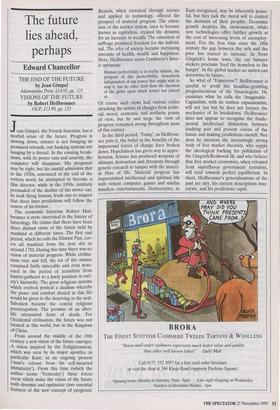The future lies ahead, perhaps
Edward Chancellor
THE END OF THE FUTURE by Jean Gimpel Adamantine Press, £14.95, pp. 125 VISIONS OF THE FUTURE by Robert Heilbronner OUP, £13.99, pp. 133 Jean Gimpel, the French historian, has a morbid sense of the future. Progress is slowing down, science is not bringing its promised rewards, our banking systems are hanging by a thread. In the ensuing break- down, with its power cuts and anarchy, the computer will disappear. His prognosis may be right, but his candid admission that in the 1930s, convinced of the end of the written word, he attempted to become a film director, while in the 1950s, similarly persuaded of the decline of the motor car, he took flying lessons, leads one to suspect that these later predictions will follow the course of his former.
The economic historian Robert Heil- bronner is more interested in the history of futurology. He claims that there have been three distinct views of the future held by mankind at different times. The first vast period, which he calls the Distant Past, cov- ers all mankind from the year dot to around 1750. During this time there was no vision of material progress. While civilisa- tions rose and fell, the lot of the masses remained fairly miserable and even wors- ened in the period of transition from hunter-gatherer to a lowly position in soci- ety's hierarchy. The great religious systems which evolved posited a dualism whereby the peace and comfort denied in this life would be given to the deserving in the next. Salvation became the central religious preoccupation. The promise of an after- life attenuated fears of death. For Occidental civilisation, the future was not located in this world, but in the Kingdom of Christ.
From around the middle of the 18th century a new vision of the future emerges. A vision inspired by the Enlightenment, which was seen by its major apostles, in particular Kant, as an ongoing process (`man's release from his self-incurred immaturity'). From this time (which the author terms 'Yesterday') three forces occur which make the vision of the future both dynamic and optimistic (two essential features of the new concept of progress). Reason, when exercised through science and applied in technology, offered the prospect of material progress. The exten- sion of the market system, later to become known as capitalism, created the dynamic for an increase in wealth. The extension of suffrage promised freedom for the individ- ual. The telos of society became increasing amounts of health, wealth and happiness. Here, Heilbronner notes Condorcet's hero- ic optimism:
Human perfectibility is in reality infinite, the progress of this perfectibility, henceforth independent of any power that might wish to stop it, has no other limit than the duration of the globe upon which nature has placed us.
Of course such views had various critics attacking the nature of changes from politi- cal, moral, economic and aesthetic points of view, but by and large the view of progress remained strong throughout most of this century. In the third period, 'Today', as Heilbron- ner puts it, the belief in the benefits of the impersonal forces of change have broken down. Hopefulness has given way to appre- hension. Science has produced weapons of ultimate destruction and threatens through genetic research to tamper with the materi- al fibre of life. Material progress has impoverished intellectual and spiritual life with violent computer games and similar mindless entertainments. Democracies, as Kant recognised, may be inherently peace- ful, but they lack the moral will to control the destinies of their peoples. Economic growth destroys the environment, while new technologies offer further growth at the cost of increasing levels of unemploy- ment. For the first time since the 18th century the gap between the rich and the poor has started to increase. In Newt Gingrich's home town, the car bumper stickers proclaim 'feed the homeless to the hungry'. In the global market no nation can determine its future.
So what of 'Tomorrow'? Heilbronner is careful to avoid the headline-grabbing prognostications of the futurologists. He examines what he calls the 'imaginable'. Capitalism, with its restless expansionism, will not last but he does not foresee the mechanics of its breakdown. Heilbronner does not appear to recognise the funda- mental intellectual distinction between studying past and present visions of the future and making predictions oneself. Nor does he mention the increasingly strong body of free market theorists, who supply the ideological backing for politicians of the Gingrich/Redwood ilk, and who believe that free market economies, when released from superfluous government restraints, will tend towards perfect equilibrium. In short, Heilbronner's generalisations of the past are airy, his current descriptions inac- curate, and his predictions vapid.


















































































 Previous page
Previous page